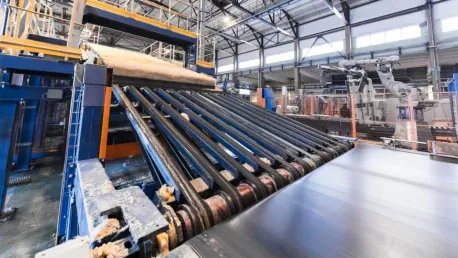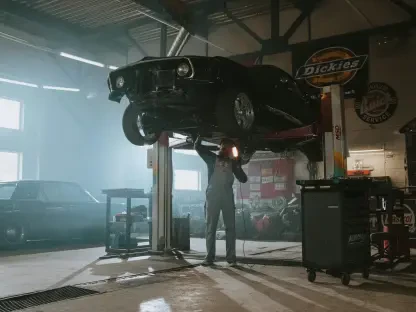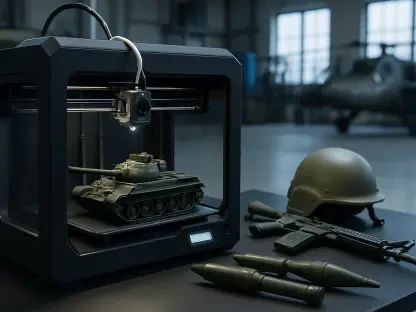Reed Switch Developments Corp. (RSD), a distinguished, 100% woman-owned and led company, has made considerable strides in the manufacturing world by leveraging automation technology. As we delve into how RSD employs automation to manage its impressive growth, maintain quality, and sustain high-performance manufacturing standards, the strategies and experiences of this forward-thinking company offer valuable insights. The transformation undergone by RSD is not merely about adopting new technologies but strategically integrating them to enhance the company’s existing strengths and ensure sustainable development.
Growing Through Strategic Customer Engagement
RSD’s recent growth has been driven by a blend of new and existing customers. President Debra Dahlin emphasizes that this balanced growth across the customer base is due to RSD’s unique capability to produce custom reed switches and sensors in small to medium volumes. By catering to end-of-line and obsolete component requirements, RSD provides a pivotal service that resonates strongly with its clients. The company’s technical expertise and flexibility in designing bespoke solutions have significantly contributed to strong customer loyalty.
Being a multi-generational, family-owned business, RSD has built stable and long-lasting relationships with its customers. These relationship-based interactions enhance business continuity and trust, which are crucial for both customer retention and continuous growth. The company emphasizes the importance of such bonds, highlighting how the family-run nature of the business contributes to seamless, trust-driven engagement. The sense of reliability and personal touch fosters an environment where clients feel valued and understood, ensuring their recurring patronage and positive word-of-mouth referrals.
Advancements in Factory Floor Automation
RSD has made significant progress in automating its manufacturing processes. By the year’s end, four out of five primary manufacturing processes are expected to be fully automated, including the critical potting process. These automation advances help to address the internal allocation of staff to multiple roles, enabling RSD to maintain its forward momentum without diverting essential resources. Automation serves not just as a tool for efficiency but as a pivotal strategy to address labor allocation, ensuring human resources are optimized for more complex and strategic tasks.
The strategic implementation of automation allows RSD to meet increasing demand without escalating costs or sacrificing product quality. Automatic systems streamline production, mitigate human error, and ensure a level of consistency and reliability that manual processes cannot achieve. This progression in automation technology stands as a testament to RSD’s commitment to efficiency and excellence. The company’s proactive approach to embracing technology allows for scalable solutions, reflecting a forward-thinking attitude that keeps them ahead in a competitive market.
Quality Assurance Through Automation
Quality assurance is at the core of RSD’s operations. Engineering and QA Manager Jeff Rosenbaum highlights that automation has enabled the company to maintain its zero-defect manufacturing culture. Automated systems ensure consistency in production quality, accelerate production timelines, and minimize human error. This is particularly crucial for RSD’s custom orders, which often involve intricate specifications that demand precise adherence to design and quality standards. The drive for impeccable standards ensures that RSD’s offerings meet or exceed the stringent requirements of various industries.
The automation of quality control processes allows for efficient handling of larger volume demands, ensuring that RSD can fulfill orders without compromising quality. This capability not only bolsters the company’s reputation for high-quality products but also enhances its capacity to undertake bespoke projects for niche markets, where precision and reliability are paramount. Maintaining such high standards is integral to building long-term trust with clients and upholding RSD’s standing as an industry leader in manufacturing excellence.
Tackling Automation Challenges
Automation in manufacturing does not come without its challenges. RSD encountered significant hurdles with the delicate nature of their reed switch components, which required precise material handling and assembly. By working closely with automation vendors and integrating custom tooling and robotics specifically designed for magnetic reed switch production, RSD was able to overcome these obstacles. The approach of collaborative innovation proves crucial in addressing the unique demands of their specialized products.
Customization of automation solutions ensured that these technologies complemented rather than replaced human oversight, thus maintaining the integrity of the production process. This collaborative approach highlights the importance of tailoring industrial automation solutions to the unique needs of a product, ensuring a seamless blend of technology and expertise. Integrating custom-built solutions not only addresses existing challenges but also sets a flexible foundation for future advancements and scalability.
Enhancing Custom Product Development
Automation has played a critical role in improving the efficiency and rapid iteration of custom product designs at RSD. Dahlin points out that aligning lean manufacturing goals with process automation based on common batch sizes and customization characteristics has enabled the company to support niche customer projects more effectively. This strategic alignment of processes ensures resource optimization and responsiveness to client specifications, even in highly customized orders.
The integration of advanced automation allows for quicker design iterations and the early incorporation of manufacturability considerations. This streamlining of the development process ensures that RSD can meet the specific needs of its clients, delivering high-quality, bespoke solutions in a timely and cost-effective manner. By honing their capacity for rapid customization, RSD continues to meet and exceed the evolving demands of various sectors, reinforcing its reputation for innovation and reliability.
Boosting Production Accuracy and Repeatability
Precision is vital in the manufacturing of reed switches and sensors. Industries such as automotive, aerospace, and medical devices rely heavily on consistent and accurate components. Automation significantly enhances the accuracy and repeatability of production at RSD. According to Rosenbaum, automated processes enable precise control over operational characteristics such as magnetic sensitivity and activation distance. This meticulous precision is essential for ensuring product functionality and safety in critical applications.
This precision reduces variability and ensures that all products meet the stringent standards required for high-performance applications. The ability to maintain such consistency is essential for the reliability and functionality of the end products in critical applications. Through automation, RSD manages to uphold the exacting standards of precision essential for its diverse clientele, proving the effectiveness of their technological investments in achieving superior production quality.
Implementing Automated Quality Control Systems
Automated quality control systems are essential for maintaining the reliability of RSD’s products. These systems facilitate consistent performance monitoring at each production stage, resulting in fewer defects and the ability to meet stringent quality standards. This level of quality assurance is especially important in industries where even the smallest defect can have significant consequences. The role of automation in quality control signifies a leap toward more reliable and efficient production processes, directly impacting customer satisfaction and regulatory compliance.
By utilizing automated testing and quality control processes, RSD can ensure that its products consistently meet the high standards set by regulatory bodies and customer expectations. This adherence to quality is a cornerstone of RSD’s reputation and success. The consistent performance of their automated systems guarantees that each component lives up to the rigorous quality benchmarks, minimizing the risk of defects and reinforcing RSD’s claim to excellence.
The Selection and Integration of Automation Technologies
Choosing the right automation technologies was a meticulous process for RSD. The company had to assess both the precision and flexibility required for its unique manufacturing processes. RSD chose vendors that could offer customizable and scalable automation solutions capable of handling its unique components. Integrating these with existing processes ensured enhanced production without compromising the high quality RSD is known for. The deliberate selection and integration of technology were instrumental in achieving seamless automation that aligns with the company’s strategic goals.
The process of selecting and integrating these technologies required a deep understanding of the specific requirements of RSD’s production lines. Collaborating with capable vendors enabled RSD to tailor automation solutions to their unique needs while ensuring they remain adaptable for future advancements. This careful orchestration of technology selection and integration mirrors RSD’s commitment to maintaining their leading position in the industry through thoughtful, strategic investments in technology.
Conclusion
Reed Switch Developments Corp. (RSD), a prominent company that is 100% woman-owned and led, has made significant advancements in the manufacturing industry by embracing automation technology. RSD has expertly woven automation into its operations, enabling the company to handle substantial growth, uphold exceptional quality standards, and sustain high-performance manufacturing. The company’s evolution is not just about adopting new gadgets or systems but about the strategic integration of these new technologies to build on its existing strengths, ensuring ongoing, sustainable development.
RSD’s commitment to innovation and quality stands as a beacon for other manufacturing firms looking to modernize their practices. By seamlessly incorporating automation, the company has not only boosted its production capabilities but also maintained high standards of precision and reliability. This integrated approach has allowed RSD to remain competitive in a fast-evolving market while honoring its tradition of excellence.
Moreover, the leadership at RSD—being both woman-owned and led—brings a unique perspective on how diversity and inclusive management can drive a company toward success. Their story serves as a powerful example of how targeted technological adoption, coupled with strong leadership, can foster both growth and sustainability. RSD continues to inspire and set a high bar in the world of automated manufacturing.









